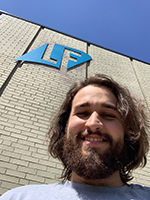Bringing Added Thrills to the Rides
Lucas Iezzi reflects on his internship experience making animatronic characters for theme parks with LF Studios and how the EDI program is shaping his approach to design innovation.
The next time you’re on a theme-park roller coaster ride and zip past an animatronic figure, you might be zooming by the work of Lucas Iezzi (EDI '24).
Iezzi is a student in Northwestern's Master of Science in Engineering Design Innovation (EDI) program. This summer, he interned with LF Studios, a design and fabrication company founded in 1990 with a mission to create memorable spaces featuring animatronic elements in entertainment and learning venues around the world. 
Iezzi’s work focused on mechanically animated characters that will become show elements along the routes of theme-park rides.
“We have many figures in the pipeline, each at various stages of development,” Iezzi said. “The projects I have worked on ranged from early layout of mechanisms, to engineering structural components, to surface development of character shells.”
LF Studios’ characters are in places such as the Abraham Lincoln Presidential Library and Museum in Springfield, Ill.; Dollywood in Pigeon Forge, Tenn; and Warner Bros. World in Abu Dhabi.
Iezzi said he found his internship fascinating.
“Every new task is its own challenge, so it is constant problem solving, which is very fun,” he said. “The work is also inherently more fun because I know they are going into theme parks, and after working on various characters in a given ride, I start to build an image of what the whole experience will feel like.”
Iezzi worked as part of an engineering group responsible for ensuring the figures they developed functioned in the way the clients requested. That meant working with manufacturers and sculptors, as well as costuming, painting, and assembly teams to ensure each component was designed and created with best practices in mind.
It also meant making sure the mechanical moving components were cost effective and robust enough to last for years.
"The most important lesson I learned is that in engineering design jobs like this one, there is fun creative work and there is work that is painstakingly detailed," he said. "In order to be successful, you have to be able to switch quickly between the zoomed in detail-oriented mindset to find clerical errors and the zoomed out bigger-picture lens to be able to make broader design decisions."
That is a skill Iezzi developed in EDI. He entered the program with an undergraduate degree in mechanical engineering, and while he valued the technical knowledge he accrued, he wasn't sure how to apply that knowledge in an impactful way.
"I felt like I was missing some aspects of the bigger picture as to what my engineering skills can be best used for," he said. "I wanted to be able to design products that solved problems that actually matter to people, and to me design was the way to find these important problems."
Iezzi’s goal is to take the lessons he learns through the EDI program and use them as a design engineer working on product development.
He got to experiment with that during his first days in EDI when he was tasked with creating something that was "Stranger than fiction." Iezzi chose to produce the desk toy of his dreams: a small baby yoda figure that levitates above a rock. The baby yoda blinks and moves its head side to side.
The project brought a smile to his face — and the faces of his classmates.
Ultimately his mission is to be part of a team making things that bring people enjoyment that extends beyond their use of the product.
The internship experience with LF Studios furthered his excitement about that mission.
"In order to be a multidisciplinary thinker, you have to actively work on and develop all aspects of your skill sets by combining them together in projects," Iezzi said. "It is not enough to have honed each discipline in a silo of its own. You must be able to integrate your skill sets into one cohesive multidisciplinary toolkit."

